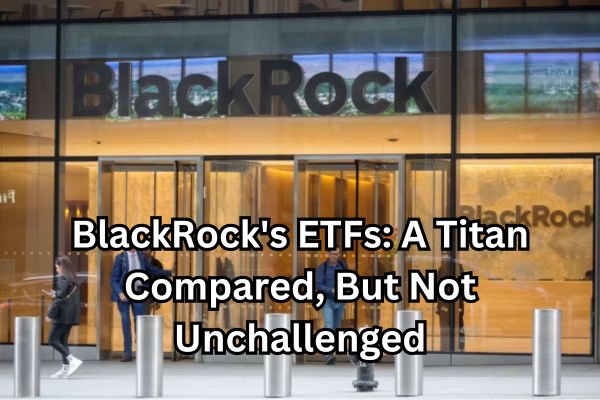BlackRock’s ETFs: A Titan Compared, But Not Unchallenged
Exchange-traded funds (ETFs) have revolutionized the investment landscape, offering low-cost, diversified exposure to various asset classes. BlackRock, the world’s largest asset manager, stands as a titan in this arena, with its iShares lineup capturing a significant portion of the global ETF market. However, the ETF industry is fiercely competitive, and BlackRock faces challenges from established players and new entrants alike. This article delves into a comparative analysis of BlackRock’s ETFs against its competitors’ offerings, examining key aspects like fees, performance, and unique features.
Fee Comparison: A Tight Race, But BlackRock Often Leads
One of the primary factors influencing investor decisions is expense ratio, the annual fee charged by an ETF. BlackRock’s iShares core series boasts some of the lowest fees in the industry, with options like the iShares Core S&P 500 ETF (SPY) charging only 0.09%. This competitive pricing strategy has been a major driver of iShares’ success, attracting cost-conscious investors seeking broad market exposure.
However, BlackRock isn’t alone in the low-cost arena. Vanguard, another major ETF provider, offers a strong challenge with its globally recognized low-fee structure. For example, Vanguard’s S&P 500 ETF (VOO) charges an expense ratio of just 0.03%, undercutting even SPY. Fidelity Investments and Charles Schwab have also entered the fray, offering competitive fee structures and enticing new investors with expense ratios as low as 0%.

While BlackRock generally holds the edge in expense ratios for core, broad-market ETFs, the competition intensifies in more specialized segments. For example, thematic or sector-specific ETFs often come with higher fees due to their niche focus. In such cases, investors might find more competitive pricing options from other providers.
Performance: Tracking the Benchmark, But Not Always Outperforming
ETFs primarily aim to track the performance of their underlying index, and BlackRock’s iShares generally do a commendable job in this regard. SPY, for instance, has closely mirrored the S&P 500’s returns over various timeframes. However, achieving perfect adherence to the benchmark is often challenging, and tracking error (the difference between an ETF’s returns and its index’s returns) can occur due to factors like expense ratios and bid-ask spreads.
When it comes to outperformance, BlackRock’s ETFs haven’t consistently delivered alpha (excess return over the benchmark). While some iShares have outperformed their peers in specific categories, actively managed ETFs offered by other providers might hold an edge in terms of generating alpha, albeit with higher fees and inherent risks.
Unique Features: Beyond the Core, BlackRock Innovates
BlackRock doesn’t solely rely on low fees and passive index tracking. It consistently innovates, offering unique features that cater to diverse investor needs. Some notable examples include:
- Smart Beta ETFs: These go beyond traditional market-cap weighting, incorporating factors like profitability, value, or momentum to potentially enhance returns. iShares Edge MSCI Minimum Volatility USA ETF (USMV) exemplifies this, aiming to reduce volatility while maintaining market exposure.
- Thematic ETFs: BlackRock capitalizes on thematic trends with targeted ETFs like the iShares Global Clean Energy ETF (ICLN) or the iShares Metaverse ETF (METV), allowing investors to capture potential growth in specific sectors.
- Sustainable ETFs: Addressing the growing demand for ESG (environmental, social, and governance) investing, BlackRock offers a range of sustainable ETFs that align with specific ESG criteria. The iShares ESG Aware MSCI USA ETF (ESGU) serves as a prime example.
These unique features set BlackRock apart from some competitors who primarily focus on core, low-cost offerings. However, other providers are also upping their game in innovation, offering similar thematic and sustainable ETF options.
Conclusion: A Strong Contender, But Not the Only Game in Town
BlackRock’s iShares lineup stands tall in the ETF arena, offering a compelling combination of low fees, diverse choices, and innovative features. However, the ETF landscape is constantly evolving, and competitors are nipping at BlackRock’s heels. Vanguard, Fidelity, and Charles Schwab are offering increasingly competitive fee structures and innovative products. Ultimately, investors should carefully compare expense ratios, performance, and unique features across different providers before making investment decisions. Remember, the “best” ETF depends on your individual investment goals and risk tolerance.
Unlocking the Secrets of the Binance Ankr Quiz: Alltricks.me’s Expert Answers Revealed
Related Job Updates
- iShares Bitcoin Trust (IBIT): A Gateway to Bitcoin for Traditional Investors?
- Future-Proof Your Investment with the Best Cryptocurrencies to Buy in 2024
Latest Job Posts
- TGTRANSCO Recruitment 2026: 250 Apprentice Posts for BE/BTech & Diploma
- UPSC Recruitment 2026: Apply Online for 349 Assistant Commandant Vacancies @upsc.gov.in
- GAIL Recruitment 2026: 70 Executive Trainee Vacancies, Apply Online from 20 Feb
- DSSSB Recruitment 2026: 911 Vacancies for JE, AE, Legal Assistant, Apply from 24 Feb
- RRB ALP Vacancy 2026: 11,127 Posts Approved – Notification Date & Eligibility
Important Sections:
All Jobs | Admit Cards | Results | Answer Keys | Homepage
